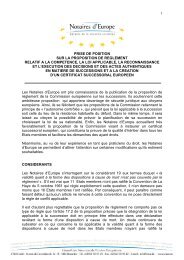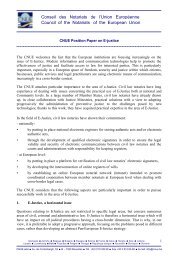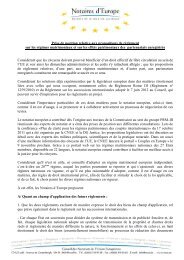A Modern Regulatory Framework for Company Law in Europe - CNUE
A Modern Regulatory Framework for Company Law in Europe - CNUE
A Modern Regulatory Framework for Company Law in Europe - CNUE
You also want an ePaper? Increase the reach of your titles
YUMPU automatically turns print PDFs into web optimized ePapers that Google loves.
II. <strong>Modern</strong> company law mak<strong>in</strong>gQuestion 2:a) Should the <strong>Europe</strong>an Union, <strong>in</strong> future company law <strong>in</strong>itiatives, make use ofalternatives as <strong>in</strong>dicated to primary legislation <strong>in</strong> directives?- Yes, if the aim is to <strong>in</strong>tervene <strong>in</strong> the framework determ<strong>in</strong>ed by primary legislationus<strong>in</strong>g a secondary legislation, because the latter allows us greater flexibility.- No, as regards best practice mechanisms: these must be determ<strong>in</strong>ed accord<strong>in</strong>gto the rules of the free market, which the Community <strong>in</strong>stitutions can, at best,monitor.b) What areas of company law, and which alternatives, are particularly suited <strong>for</strong>such an alternative approach?In the area of Corporate Governance: rules should be determ<strong>in</strong>ed <strong>in</strong> relation to thefunction<strong>in</strong>g of general meet<strong>in</strong>gs, as well as rules govern<strong>in</strong>g the share capital<strong>for</strong>mation.III. Disclosure of <strong>in</strong><strong>for</strong>mation as a regulatory toolQuestion 3:a) Do you agree that disclosure requirements can sometimes provide a moreefficient regulatory tool than substantive rules?b) In what areas of company law should the emphasis be on disclosurerequirements rather than substantive rules?Yes, this should apply particularly to the area of Corporate Governance and grouppolicies, tak<strong>in</strong>g <strong>in</strong>to consideration the <strong>in</strong>escapable character of the legislativeprovisions protect<strong>in</strong>g third parties.IV. Dist<strong>in</strong>guish<strong>in</strong>g types of companiesQuestion 4:a) Should the <strong>Europe</strong>an Union, <strong>in</strong> devis<strong>in</strong>g new company law regulations andamend<strong>in</strong>g exist<strong>in</strong>g company law regulations, dist<strong>in</strong>guish more between listedcompanies, open companies and closed companies?Yes.b) In which areas of company law is this dist<strong>in</strong>ction most relevant, and what, <strong>in</strong>general terms, should be the difference <strong>in</strong> regulatory approach there?There should be greater standardisation <strong>in</strong> public and open companies; on the otherhand, priority should be given to the respect <strong>for</strong> private autonomy as well as the ruleof subsidiarity and proportionality <strong>for</strong> closed companies.V. Increased flexibility vs. tighten<strong>in</strong>g of rulesQuestion 5:Do you agree that company law should not be changed to <strong>in</strong>clude morecompulsory rules, monitor<strong>in</strong>g and en<strong>for</strong>cement regimes and procedures toachieve such regulatory objects as combat<strong>in</strong>g fraud and terrorism, but that suchDS3-réponse-cnue-17-06-02-en.doc3
Chapter 3:Specific Topics3.1 . Corporate GovernanceI. The role of the <strong>Europe</strong>an Union <strong>in</strong> corporate governance <strong>for</strong> <strong>Europe</strong>anbus<strong>in</strong>essQuestion 7:Are ef<strong>for</strong>ts to improve or strengthen corporate governance necessary andimportant <strong>for</strong> efficient bus<strong>in</strong>ess <strong>in</strong> the EU and <strong>for</strong> an <strong>in</strong>tegrated <strong>Europe</strong>ansecurities market?Yes but Corporate Governance Codes <strong>for</strong>mulated by the market participants (or onlysome of them) can never replace en<strong>for</strong>ceable rules set by democratically legitimatebodies. One must not <strong>for</strong>get that the risk of conflict of <strong>in</strong>terest is <strong>in</strong>herent <strong>in</strong> selfregulation.II. Better <strong>in</strong><strong>for</strong>mation <strong>for</strong> shareholders and creditors, <strong>in</strong> particular betterdisclosure of corporate governance structures and practices <strong>in</strong>clud<strong>in</strong>gremuneration of board membersQuestion 8:a) Should there be more disclosure on corporate governance structures andpractices of companies <strong>in</strong> <strong>Europe</strong>?Yes.b) If yes, should such a disclosure be given only by listed companies or by all"open“ companies or even by "closed" companies?These obligations should be applied to listed companies and open companies, butnot to closed companies.c) Should this disclosure <strong>in</strong>clude an <strong>in</strong>dication as to whether or not a certa<strong>in</strong>corporate governance code is followed and where and why the code is notcomplied with?Yes. Nevertheless, it is necessary to verify <strong>in</strong> advance whether or not the selfdiscipl<strong>in</strong>aryCode has been drafted by a body that is truly representative of thegeneral nature and structure of the category. In the event that this is not the case, itcould lead to an <strong>in</strong>sidious system, whereby groups of companies are <strong>in</strong>tent onchang<strong>in</strong>g the rules of open competition, apparently follow<strong>in</strong>g ethical bus<strong>in</strong>esspractices, while actually pursu<strong>in</strong>g more selfish <strong>in</strong>terests.d) Should the remuneration of <strong>in</strong>dividual board members be disclosed, <strong>in</strong>particular if it is l<strong>in</strong>ked to the share price per<strong>for</strong>mance ?e) Should the shareholders have a role <strong>in</strong> fix<strong>in</strong>g the pr<strong>in</strong>ciples and limits of boardremuneration?DS3-réponse-cnue-17-06-02-en.doc5
III. Strengthen<strong>in</strong>g shareholders’ rights and m<strong>in</strong>ority protection, <strong>in</strong> particularsupplement<strong>in</strong>g the right to vote by special <strong>in</strong>vestigation proceduresQuestion 9:Should shareholders' rights and decision-mak<strong>in</strong>g, <strong>in</strong>clud<strong>in</strong>g m<strong>in</strong>ority protection,be enhanced by <strong>Europe</strong>an law, <strong>in</strong> particular by enabl<strong>in</strong>g the general meet<strong>in</strong>g ofshareholders, by resolution, or a qualified m<strong>in</strong>ority of shareholders to apply to acourt or an appropriate adm<strong>in</strong>istrative body <strong>for</strong> the order<strong>in</strong>g of a special<strong>in</strong>vestigation?Yes, but with<strong>in</strong> certa<strong>in</strong> limits, which do not leave any scope <strong>for</strong> manoeuvres orobstructive practices, or confusion.IV. Strengthen<strong>in</strong>g the duties of the board, <strong>in</strong> particular the accountability ofdirectors where the company becomes <strong>in</strong>solventQuestion 10:Should the <strong>Europe</strong>an Union <strong>in</strong>troduce a framework rule which would holdcompany directors accountable <strong>for</strong> lett<strong>in</strong>g the company cont<strong>in</strong>ue to do bus<strong>in</strong>esswhen it can no longer pay its debts?No, this is not useful, because it would be better to adopt uni<strong>for</strong>m and unequivocalrules concern<strong>in</strong>g the general liability of company directors <strong>for</strong> all the member countriesof the <strong>Europe</strong>an Union that go beyond the particular case of cont<strong>in</strong>u<strong>in</strong>g to do bus<strong>in</strong>ess.V. Need <strong>for</strong> a <strong>Europe</strong>an corporate governance code or co-ord<strong>in</strong>ation of nationalcodes <strong>in</strong> order to stimulate development of best practice and convergence?Question 11:a) Is there a need <strong>for</strong> a voluntary <strong>Europe</strong>an corporate governance code <strong>in</strong>addition to or <strong>in</strong>stead of the various national corporate governance codes?A complementary voluntary <strong>Europe</strong>an code would be desirable at some time <strong>in</strong> thefuture, but <strong>for</strong> the time be<strong>in</strong>g this is not necessary, s<strong>in</strong>ce this does not correspond tothe current situation of <strong>Europe</strong>an enterprises.b) If yes, please give examples of what rules and recommendations a <strong>Europe</strong>ancorporate governance code should conta<strong>in</strong>.c) Should the <strong>Europe</strong>an Union facilitate the co-ord<strong>in</strong>ation of national codes <strong>in</strong>order to stimulate development of best practice and convergence?At present, operators need to be able to compare national self-discipl<strong>in</strong><strong>in</strong>g codes, <strong>in</strong>order to identify standards that can re-en<strong>for</strong>ce their credibility on the market andattract <strong>in</strong>ternational <strong>in</strong>vestments. There is there<strong>for</strong>e a trend towards a convergenceof systems.Once a certa<strong>in</strong> degree of convergence has voluntarily been achieved <strong>in</strong> terms ofpractices <strong>in</strong> the Bus<strong>in</strong>ess community, we can perhaps direct our attention towardsEU <strong>in</strong>tervention at a legislative level.It the meantime, it would be opportune to monitor the evolution of the selfdiscipl<strong>in</strong><strong>in</strong>grules.DS3-réponse-cnue-17-06-02-en.doc6
3.2. Shareholder In<strong>for</strong>mation,Communication and Decision-mak<strong>in</strong>gI. IntroductionII. Notice and pre-meet<strong>in</strong>g communicationQuestion 12:a) Should listed companies be required to establish on their websites devices(bullet<strong>in</strong> boards, chat rooms or similar devices) that allow <strong>for</strong> electroniccommunication between shareholders and the company and amongshareholders prior to general meet<strong>in</strong>gs, <strong>in</strong>clud<strong>in</strong>g, with respect to notices ofgeneral meet<strong>in</strong>gs, submissions of proposals and questions and solicitations ofproxies ?Yes, but only <strong>in</strong>sofar as shareholders have the option, and not the obligation, tocommunicate with each other by electronic means.b) If listed companies are required to establish these or similar devices on theirwebsites, should the shareholders then be required to communicate byelectronic means and thus be compelled to abandon the use of traditional meansof communication, or should electronic communication only be an alternativeavailable to those <strong>in</strong>terested?No, that is only an alternative option.Question 13:a) Is there a need, at the <strong>Europe</strong>an Union level, to provide <strong>for</strong> m<strong>in</strong>imumstandards regard<strong>in</strong>g the right <strong>for</strong> shareholders to ask questions and submitproposals <strong>for</strong> decision-mak<strong>in</strong>g at the general meet<strong>in</strong>g?Yes.b) If so, what should these m<strong>in</strong>imum standards be (m<strong>in</strong>imum sharehold<strong>in</strong>g <strong>for</strong>rais<strong>in</strong>g questions and submitt<strong>in</strong>g proposals; time of submission of proposal <strong>for</strong>decision-mak<strong>in</strong>g)?We must avoid creat<strong>in</strong>g <strong>in</strong>struments that lead to erratic actions, or confusion, oreven obstructions. The standards must be such that they correspond to thesubstantial and significant <strong>in</strong>terests relat<strong>in</strong>g to company dialectics.III. The meet<strong>in</strong>g, electronic access, proxy vot<strong>in</strong>gQuestion 14:a) Should listed companies be required to provide facilities <strong>for</strong> proxy vot<strong>in</strong>g byall shareholders?Yes.b) Should listed companies be enabled or required to offer to their shareholderselectronic facilities <strong>for</strong> proxy vot<strong>in</strong>g or should they and their shareholders evenbe required to use electronic proxy vot<strong>in</strong>g and thus abandon the use oftraditional proxies?DS3-réponse-cnue-17-06-02-en.doc7
The fundamental issue is one of guarantee<strong>in</strong>g the authenticity of electronic datatransmission.The use of electronic media must rema<strong>in</strong> optional; it would not be appropriate toabandon the traditional system.c) Should companies be enabled or even required to allow absenteeshareholdersto participate <strong>in</strong> traditional general meet<strong>in</strong>gs via electronic means,<strong>in</strong>clud<strong>in</strong>g via the <strong>in</strong>ternet (web-cast) and satellite?Yes. The essential po<strong>in</strong>t is that such a system must be able to provide the sameguarantees and dynamics as those of the general meet<strong>in</strong>g itself, as if it were <strong>in</strong> thesame physical space, given that the exchange of ideas constitutes an added value<strong>in</strong> comparison to the simple sum of each member’s will. Thus, it would be necessaryto:- guarantee the verification of legal conditions perta<strong>in</strong><strong>in</strong>g to <strong>for</strong>mation, participationand identification <strong>for</strong> Internet access to the General Meet<strong>in</strong>g;- guarantee the verification of the authenticity of electronic transmission;- guarantee electronic access to documents and <strong>in</strong><strong>for</strong>mation that are at thedisposal of the persons physically participat<strong>in</strong>g <strong>in</strong> the General Meet<strong>in</strong>g;- guarantee simultaneous audio-visual relay between participants;- guarantee the reliability of m<strong>in</strong>utes.The use of electronic media must be optional; the traditional method should not beabandoned.d) Should companies which offer a comprehensive electronic process of<strong>in</strong><strong>for</strong>mation to, communication with and decision-mak<strong>in</strong>g by shareholders beenabled to abandon the traditional type of general meet<strong>in</strong>g?No, the protection of small shareholders at the general meet<strong>in</strong>g must beguaranteed. However this may be, there is no justification, either from a technical orlegal po<strong>in</strong>t of view <strong>for</strong> the total elim<strong>in</strong>ation of the General Meet<strong>in</strong>g.IV. Vot<strong>in</strong>g by <strong>in</strong>stitutional <strong>in</strong>vestorsQuestion 15:a) Should <strong>in</strong>stitutional <strong>in</strong>vestors <strong>in</strong> <strong>Europe</strong>, or, alternatively, all shareholdershold<strong>in</strong>g a certa<strong>in</strong> percentage of the share capital, be required to disclose theirpolicy as regards the <strong>in</strong>vestments they make, and as to how they exercise theirvot<strong>in</strong>g rights?No, this would amount to a mis<strong>in</strong>terpretation of transparency. It is the market thattells <strong>in</strong>vestors which is the most appropriate way to behave to ma<strong>in</strong>ta<strong>in</strong> theexchange value of the shares.b) Should <strong>in</strong>stitutional <strong>in</strong>vestors be required to exercise vot<strong>in</strong>g rights withrespect to shares they hold?No, absta<strong>in</strong><strong>in</strong>g from cast<strong>in</strong>g a vote also constitutes an expression of the freedom ofthe right to vote, and <strong>in</strong>stitutional <strong>in</strong>vestors are perfectly aware of the effects of theirconducts at a general meet<strong>in</strong>g.DS3-réponse-cnue-17-06-02-en.doc8
to become an obstacle at the most critical moment, which is that of the creation ofcompanies.c) Do you consider that "wrongful trad<strong>in</strong>g" is an effective <strong>in</strong>strument <strong>for</strong> creditorprotection?Yes, if it is added to the rules relat<strong>in</strong>g to the general liability of company directors.d) Do you consider that subord<strong>in</strong>ation is an effective and desirable way ofenhanc<strong>in</strong>g creditor protection?Yes, if it is added to other rules <strong>for</strong> creditor protection.e) Are there any other possibilities worth consider<strong>in</strong>g?No.Question 19:a) Do you believe that other <strong>for</strong>ms of consideration, such as services, should beallowed as valid <strong>for</strong>ms of consideration <strong>for</strong> capital?Yes, provided the correct f<strong>in</strong>ancial assessment of the services and capital<strong>in</strong>tangibility is guaranteed, and respect<strong>in</strong>g the rules relat<strong>in</strong>g to the real composition<strong>for</strong> the capital such as is constituted by contributions <strong>in</strong> k<strong>in</strong>d and cash.b) Do you th<strong>in</strong>k the prohibition of f<strong>in</strong>ancial assistance <strong>for</strong> the acquisition of ownshares should be elim<strong>in</strong>ated or at least that f<strong>in</strong>ancial assistance should beallowed if it complies with the general rules <strong>for</strong> distributions to shareholders?The current situation seems to be satisfactory.3.4. The Function<strong>in</strong>g of Groups of CompaniesI. The existence of groups of companies as a useful and legitimate economicrealityQuestion 20:a) Are groups of companies frequent <strong>in</strong> your country?Yes.b) What, <strong>in</strong> your view, are the specific advantages, disadvantages and riskspresented by groups?- As regards <strong>in</strong>dividual companies that belong to a group, there are numerous risksof all k<strong>in</strong>ds, relat<strong>in</strong>g to the consideration <strong>for</strong> quotas sacrificed to the group logic, andas such <strong>for</strong>eign to a given company’s <strong>in</strong>terests, as well as situations that could evendamage the <strong>in</strong>terests of <strong>in</strong>dividual companies <strong>in</strong> the group, and which may haveartificial repercussions on the other companies, <strong>for</strong> example, by divert<strong>in</strong>g the<strong>in</strong>terests of <strong>in</strong>dividual companies, and f<strong>in</strong>ally, the problem of conflict of <strong>in</strong>terests <strong>for</strong>company directors belong<strong>in</strong>g to several boards of the group.Nevertheless, s<strong>in</strong>ce the group is <strong>in</strong> a position to constitute the critical necessary<strong>for</strong>ce to be competitive on the market (both strictly <strong>in</strong> terms of productivity, and asregards the availability of <strong>in</strong>tegrated services at a low cost), the issues have to bebalanced <strong>in</strong> terms of: a) transparency, simultaneously, both at an <strong>in</strong>dividual andgroup level (see the lessons learnt from the ENRON case); and b) a reciprocaldialogue between the companies, based on the pr<strong>in</strong>ciple of the compensatoryadvantages and equa return on <strong>in</strong>vestments made by m<strong>in</strong>ority shareholders.DS3-réponse-cnue-17-06-02-en.doc10
II. Transparency of group relationsQuestion 21:a) Should the 7 th <strong>Company</strong> <strong>Law</strong> Directive on group accounts be supplemented byrules that require greater transparency of group relations and of possible risksaris<strong>in</strong>g from them both to the subsidiary and to the parent?Yes.b) What should such enhanced transparency <strong>in</strong>clude?The fundamental element is the simultaneity of <strong>in</strong><strong>for</strong>mation relat<strong>in</strong>g to each<strong>in</strong>dividual company and the group. This means, on the one hand, the possibility ofbe<strong>in</strong>g able to consult the accounts of each company simultaneously, ofunderstand<strong>in</strong>g its role and its perspectives with<strong>in</strong> the group, but also of be<strong>in</strong>g able toga<strong>in</strong> easy access to <strong>in</strong><strong>for</strong>mation from other companies of the group, as well as theiraccounts. On the other hand, it also means the possibility of consult<strong>in</strong>g the group’saccounts, as if they belonged to just a s<strong>in</strong>gle company, and to which all the<strong>in</strong>dividual companies belong as simple units or divisions; each of which submitt<strong>in</strong>gits own accounts (or sub-accounts), compos<strong>in</strong>g the elements of a s<strong>in</strong>gle andassociated account.c) If not <strong>in</strong> general, should such group transparency rules at least apply to listedcompanies?Yes.d) Are special rules <strong>for</strong> banks and other f<strong>in</strong>ancial <strong>in</strong>stitutions needed?Yes.III. Problems <strong>for</strong> the creation and function<strong>in</strong>g of groups of companies: tensionsbetween the <strong>in</strong>terests of the group and its partsQuestion 22:Is it desirable to require Member States to provide <strong>for</strong> a "safe harbour" whichallows those concerned with the management of the companies with<strong>in</strong> a groupto adopt a coord<strong>in</strong>ated policy provided that the <strong>in</strong>terests of creditors of thecompanies with<strong>in</strong> the group are effectively protected and that there is a fairbalance of advantage <strong>for</strong> shareholders over time?Yes.IV. PyramidsQuestion 23:a) Are pyramids of companies frequent <strong>in</strong> your country?Yes.b) Are they useful or harmful or <strong>in</strong>different?They are <strong>in</strong>different. They are one of the complex legal structures of Westerncompanies, and they should at least <strong>in</strong> pr<strong>in</strong>ciple benefit from the right of freedom ofassociation <strong>for</strong> meritorious purposes.If the conditions of transparency and protection relat<strong>in</strong>g to the a<strong>for</strong>e-stated itemshave been created, the problem of pyramids becomes an issue of rivalry of types ofcontrol and defence aga<strong>in</strong>st escalation, as well as the ma<strong>in</strong>ta<strong>in</strong><strong>in</strong>g the value ofshares owned by small shareholders, who do not enjoy the price advantages thatDS3-réponse-cnue-17-06-02-en.doc11
are available to the strategic percentage. These factors impose specific legislativerequirements.c) If you consider them to be harmful, what are the specific risks they present?d) Are specific measures beyond group transparency appropriate and desirable<strong>for</strong> pyramids of companies?Yes.3.5. Corporate Restructur<strong>in</strong>g and MobilityI. IntroductionII. Change of corporate registered office, or domicileQuestion 24:a) Do you agree that Member State laws which automatically deny recognition toany company which has its real registered office <strong>in</strong> a state other than that of its<strong>for</strong>mation should be abolished under EU law, as disproportionate <strong>in</strong>hibitions ofcommercial freedom and legal security?No, the current situation is preferable, particularly tak<strong>in</strong>g account of the differentsystems <strong>for</strong> the <strong>in</strong>corporation of companies <strong>in</strong> the member States of the <strong>Europe</strong>anUnion.b) If so, do you agree that Member States should be free to apply mandatory<strong>in</strong>ternal company law requirements, which are proportionate and nondiscrim<strong>in</strong>atory,to companies substantially based with<strong>in</strong> their territories, and howshould such connection be def<strong>in</strong>ed?c) If so, should other Member States be bound to recognise such provisions?III. 3rd Directive Mergers - position of the acquir<strong>in</strong>g companyQuestion 25:a) Should the EU requirements <strong>for</strong> special provisions govern<strong>in</strong>g mergerdecisions <strong>in</strong> acquir<strong>in</strong>g companies be removed?The company rules that impose the procedure applicable between the generalassemblies and its adm<strong>in</strong>istrative bodies, provid<strong>in</strong>g <strong>for</strong> specific opposability, aresufficient <strong>for</strong> creditors.b) Should the Member State of an acquired company be bound to accept anysuch relaxation <strong>in</strong> respect of an acquir<strong>in</strong>g company <strong>in</strong> an <strong>in</strong>ternational merger, orshould that relaxation be made mandatory <strong>for</strong> all <strong>in</strong>ternational mergers, or even<strong>for</strong> all mergers?The current <strong>Europe</strong>an legislation imposed by the third and sixth directives seems tobe satisfactory.DS3-réponse-cnue-17-06-02-en.doc12
IV. 3rd Directive - acquisition of a wholly owned subsidiaryQuestion 26:a) Should Member States be permitted to relax the directive requirements <strong>in</strong> thecase of acquisitions of 100%-subsidiaries?Yes.b) Should the Member State of the acquired subsidiary be required to acceptsuch relaxation by the Member State of the hold<strong>in</strong>g company <strong>in</strong> an <strong>in</strong>ternationalmerger?Yes.c) Or should such requirements be removed <strong>in</strong> all such <strong>in</strong>ternational cases, or <strong>in</strong>all cases, <strong>in</strong>ternational or not?No.V. Creditor protection <strong>in</strong> restructur<strong>in</strong>gQuestion 27:a) Should the creditor protection requirements <strong>for</strong> reductions of capital, mergersand transfers of registered offices be aligned as proposed above?Yes, but by provid<strong>in</strong>g a high level of protection.b) If so, should such alignment be conf<strong>in</strong>ed to <strong>in</strong>ternational mergers andtransfers of corporate domicile or should it apply to all EU restructur<strong>in</strong>gprovisions?It should apply to all transactions to avoid the phenomenon of <strong>for</strong>um shopp<strong>in</strong>g.VI. Squeeze-outs and sell-outsQuestion 28:a) Should Member States be required to <strong>in</strong>troduce provisions enabl<strong>in</strong>g a majorityshareholder (the majority to be set at not less than 90% nor more than 95%) <strong>in</strong> acompany to buy out the m<strong>in</strong>ority <strong>for</strong> a fairly appraised price?Yes, it is a sacrifice acceptable by the m<strong>in</strong>ority, if the price is right, while it makes thepurchase more attractive <strong>for</strong> the bidder.b) Should m<strong>in</strong>ority shareholders have a correspond<strong>in</strong>g right to be bought outwhere the 90-95% threshold has been reached?Yes.c) In companies with more than one class of share should the rule operate on aclass by class basis?Yes.N.B.: It is thought that the appropriateness of this <strong>in</strong>crease <strong>in</strong> discipl<strong>in</strong>e should beassessed <strong>in</strong> the light of the <strong>in</strong>crease <strong>in</strong> the burden, and the costs, of organis<strong>in</strong>gthe rules that it implies. It should not concern closed companies. Moreover, itwould be desirable to leave each Member State free to decide whether to adoptthis rule.DS3-réponse-cnue-17-06-02-en.doc13
VII. Other issuesQuestion 29:Is there a need <strong>for</strong> legislation at the EU level provid<strong>in</strong>g <strong>for</strong> restructur<strong>in</strong>g <strong>in</strong> waysnot already discussed above?No.3.6. The <strong>Europe</strong>an Private <strong>Company</strong>I. An <strong>in</strong>itiative to establish a <strong>Europe</strong>an Private <strong>Company</strong>Question 30:a) Do you th<strong>in</strong>k there is a specific need <strong>for</strong> a new <strong>Europe</strong>an legal <strong>for</strong>m ofcompany, complementary to the SE and national <strong>for</strong>ms of private companies, the<strong>Europe</strong>an Private <strong>Company</strong> as proposed?Yes, <strong>in</strong> order to provide an operational model <strong>for</strong> modern SMEs (small and mediumsizedenterprises) that is capable of resolv<strong>in</strong>g problems on a <strong>Europe</strong>an level.Develop<strong>in</strong>g a model <strong>for</strong> <strong>Europe</strong>an private companies is both important and useful,provided that it respects the conditions of legal security and the <strong>for</strong>ms required byeach national legislative framework.b) If not, do you th<strong>in</strong>k a <strong>Europe</strong>an model <strong>for</strong> regulation of private companies is adesirable and appropriate way to encourage Member States to adopt flexibleregulation of private companies?No.II. Incorporation of the <strong>Europe</strong>an Private <strong>Company</strong>Question 31:Do you th<strong>in</strong>k that it should be possible <strong>for</strong> a <strong>Europe</strong>an Private <strong>Company</strong> to beset up by both <strong>in</strong>dividuals and legal entities and by one or more nationals of oneMember State, as long as the <strong>Europe</strong>an Private <strong>Company</strong> undertakes economicactivities <strong>in</strong> two or more Member States?Yes.III. A genu<strong>in</strong>e <strong>Europe</strong>an companyQuestion 32:a) Do you th<strong>in</strong>k that the <strong>Europe</strong>an Private <strong>Company</strong> <strong>for</strong> the company lawapplicable to it could be exclusively governed by the provisions of the regulationand the provisions of its articles which are not <strong>in</strong>consistent therewith, withautonomous <strong>in</strong>terpretation ultimately by the <strong>Europe</strong>an Court of Justice?The answer is the same as was given to question 30 a).b) Or is it necessary to refer to the law applicable to private companies <strong>in</strong> theMember State of <strong>in</strong>corporation where a question is not answered <strong>in</strong> theregulation of the <strong>Europe</strong>an Private <strong>Company</strong> or its articles of association?Here, the pr<strong>in</strong>ciple of subsidiarity should prevail, on the grounds that thedevelopment of models and pr<strong>in</strong>ciples <strong>for</strong> companies derives from the expressDS3-réponse-cnue-17-06-02-en.doc14
needs of national communities. Today, <strong>in</strong> <strong>Europe</strong>, a jo<strong>in</strong>t sensitivity that is wellarticulated and shared <strong>in</strong> order to lead to the creation of a new self-sufficient modeldoes not exist, and as such, any operation that simply attempts to imposeCommunity rules would lead to an artificial “laboratory-produced” model, and not tothe creation of a long-stand<strong>in</strong>g and cont<strong>in</strong>uous tradition.3.7. Co-operatives and Other Forms of EnterpriseI. Regulation of the <strong>Europe</strong>an Co-operative, <strong>Europe</strong>an Association and <strong>Europe</strong>anMutual SocietyQuestion 33:a) Do you consider that the enactment of the proposed regulations is necessaryor desirable?Yes.b) What is your assessment of the potential these regulations have <strong>in</strong> thesolution of the problems affect<strong>in</strong>g co-operatives and other <strong>for</strong>ms of enterprise <strong>in</strong>the <strong>Europe</strong>an Union?Creat<strong>in</strong>g a cooperative movement at a <strong>Europe</strong>an level would mean re<strong>in</strong><strong>for</strong>c<strong>in</strong>g itscompetitiveness <strong>in</strong> relation to other company models that operate on <strong>in</strong>ternationalmarkets (cf. its potential <strong>in</strong> terms of adjudication).II. Harmonisation of national laws on co-operatives, associations and mutualsocietiesQuestion 34:a) Do you th<strong>in</strong>k there should be harmonised rules <strong>in</strong> <strong>Europe</strong> <strong>for</strong> these alternative<strong>for</strong>ms of enterprise?Yes.b) Do you consider it to be satisfactory that the regimes <strong>in</strong> the proposedregulations are completed by application of the <strong>Company</strong> <strong>Law</strong> Directives, whichdo not apply to the national <strong>for</strong>ms of these enterprises?Yes, because legislation that is not expressly adopted will <strong>in</strong>evitably be secondary,and relate to non structurally specific questions concern<strong>in</strong>g the cooperativephenomenon that are common to the collective organisational structures of thecompany.III. Foundations <strong>in</strong> <strong>Europe</strong>Question 35:a) Do you th<strong>in</strong>k there is a need <strong>for</strong> a specific regulation of the <strong>Europe</strong>anFoundation?DS3-réponse-cnue-17-06-02-en.doc15
No, because generally speak<strong>in</strong>g, it is an <strong>in</strong>stitution that is particular to each MemberState.b) Do you th<strong>in</strong>k that national rules of Member States relat<strong>in</strong>g to foundationsshould be harmonised to some extent (as <strong>for</strong> other <strong>for</strong>ms of enterprise, seequestion 34)?Yes.IV. Enterprise lawQuestion 36:a) Do you th<strong>in</strong>k a def<strong>in</strong>ition of “enterprise” <strong>in</strong> EU-law would be useful?Yes.b) If so, do you agree on the elements of economic activity and organisation asthe ma<strong>in</strong> elements <strong>in</strong> the def<strong>in</strong>ition?Yes, but provided that this respects the sphere of autonomy given to traditionalliberal professions, which are considered as be<strong>in</strong>g part of the very fabric of<strong>Europe</strong>an society, and which answer to the pr<strong>in</strong>ciple of subsidiarity.c) Do you th<strong>in</strong>k basic harmonised rules should be applied only to limited liabilityentities?No. The def<strong>in</strong>ition of an “enterprise” constitutes one of the fundamental categories,and, as such, it should be applied liberally, beyond the specific requirements o<strong>for</strong>ganisational models. In this way, there is also the positive effect of hav<strong>in</strong>g a set ofgeneral pr<strong>in</strong>ciples.Question 37:a) Do you th<strong>in</strong>k there is a need to <strong>in</strong>troduce harmonised rules <strong>in</strong> <strong>Europe</strong> <strong>for</strong>registration, access to core data and powers of representation relat<strong>in</strong>g toenterprises as def<strong>in</strong>ed above?Yes. The standardisation and generalisation of certa<strong>in</strong> fundamental notions areessential to elim<strong>in</strong>ate the differences between <strong>in</strong><strong>for</strong>mation (<strong>in</strong><strong>for</strong>mation divergences),and above all, if it relates to the deficit that an operator could <strong>in</strong>cur due to hisignorance of the <strong>for</strong>eign market on which he is go<strong>in</strong>g to operate. This makes thefreedom of movement more effective, and reduces the costs of mak<strong>in</strong>g reports andreduces risks, as well as mak<strong>in</strong>g cross-border relations more transparent.Of course, an absolute respect <strong>for</strong> the reliability of <strong>in</strong><strong>for</strong>mation and acquisition fundsis the best guarantee <strong>for</strong> the authenticity of written deeds.b) Do you th<strong>in</strong>k other issues should be addressed <strong>in</strong> an Enterprise <strong>Law</strong> Directive(f<strong>in</strong>ancial report<strong>in</strong>g, branches, groups of enterprises, trans<strong>for</strong>mation, transfer ofseat)?The philosophy of the approach on this issue tends to be based more on a basicbelief <strong>in</strong> a general Enterprise <strong>Law</strong> Directive, <strong>in</strong> the light of current Community lawdevelopments <strong>in</strong> the area of commerce, and the considerations developed <strong>in</strong> thepreced<strong>in</strong>g parts of the questionnaire. As such, it should be limited to constitut<strong>in</strong>g thelegal framework, sett<strong>in</strong>g <strong>for</strong>th the general pr<strong>in</strong>ciples and rules on which the specificdiscipl<strong>in</strong>es of each operational model and ord<strong>in</strong>ary vicissitudes of trad<strong>in</strong>g arefounded.DS3-réponse-cnue-17-06-02-en.doc16









